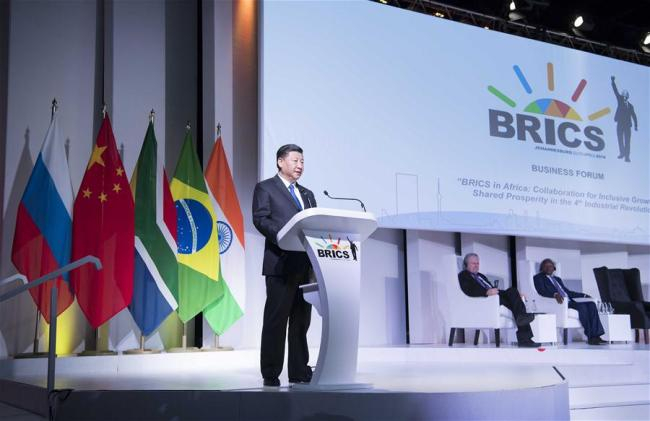
Opinions
20:21, 26-Jul-2018
Opinion: BRICS nations band together to defend multilateralism
Updated
19:29, 29-Jul-2018

Editor's note: The article was first published on China Plus, July 26.
On Wednesday as the 10th BRICS summit meeting opened in Johannesburg, Reuters news agency published an article that said the "(BRICS) collective gross domestic product grew more than six-fold from 2.7 trillion US dollars in 2000 to over 17 trillion US dollars last year, eclipsing that of the European Union.
As Donald Trump's tariff salvos threaten global trade wars, leaders from the BRICS bloc – Brazil, Russia, India, China and South Africa – are expected to band together in defense of the multilateralism the United States once championed. Analysts say global trade turmoil could give the group a shot in the arm."
The BRICS countries, amid the trade tensions triggered by the United States, have made the unanimous decision to work together to face the opportunities and challenges brought about by the digital economy and the 4th Industrial Revolution.

Chinese President Xi Jinping delivers a speech titled "Keeping Abreast of the Trend of the Times to Achieve Common Development" at the BRICS Business Forum in Johannesburg, South Africa, July 25, 2018. / Xinhua Photo
Chinese President Xi Jinping delivers a speech titled "Keeping Abreast of the Trend of the Times to Achieve Common Development" at the BRICS Business Forum in Johannesburg, South Africa, July 25, 2018. / Xinhua Photo
When addressing the BRICS Business Forum at the 10th BRICS summit in Johannesburg, China's President Xi Jinping said "BRICS countries should firmly promote an open world economy, be resolute in rejecting unilateralism and protectionism, promote trade and investment liberalization and facilitation, and jointly steer the global economy toward greater openness, inclusiveness, balanced growth, and win-win outcomes for all."
In recent years, there has been a widening of the gap in the wealth and growth of different regions of the world, which has fed into growing anti-globalization sentiments and trade protectionism.
In "The Inclusive Growth and Development Report 2017," the World Economic Forum warned that many countries are losing out on an important opportunity to revitalize their economies and reduce inequality in their societies if they do not take timely steps to adjust their approach to economic growth.
As the host country, South Africa set the theme for the Johannesburg summit as "BRICS in Africa: Collaboration for Inclusive Growth and Shared Prosperity in the Fourth Industrial Revolution."
As an active contributor to inclusive growth in the world, China has adopted a people-centered development model that is innovative, coordinated, green, open, and sharing in nature.
China has been deepening its reforms. And the country has lifted over 68 million people out of poverty over the past five years – an impressive feat of poverty reduction.
As the BRICS summit gets underway in Johannesburg, representatives from government and business circles in South Africa have expressed their hopes that African countries will raise their level of industrialization and their status in the global industrial chain by strengthening infrastructure construction and promoting free trade.
They have also called for equal participation in and sharing of the benefits of the Fourth Industrial Revolution, with the rapid advances in mobile Internet access, big data, and artificial intelligence.
Speaking at the BRICS Business Forum, President Xi noted that emerging markets and developing countries already contribute an 80 percent share of global economic growth and account for nearly 40 percent of global economic output.
If they continue to grow at their current rates, these countries will account for half of the world's economic output in a decade. Driven by a desire for development, no BRICS country wants to miss this hard-won opportunity for growth.
And China's approach of inclusive growth and shared prosperity is the right way to keep the momentum going.
Most countries have come to a consensus about the importance of inclusive growth. But realizing inclusive growth requires two things. First, it takes decisive action.
And second, it needs a long-term approach that sets aside short-term local interests. Both of these are badly needed as the world faces rising trade protectionism and isolationism.
There is a consensus among the BRICS countries that they must be the masters of their own development. Will they choose to be isolationist and unilateralist? Or inclusive and multilateralist?
The unequivocal answer can be found in the partnerships they have forged through projects such as the BRICS New Development Bank, the BRICS New Industrial Revolution partnership, and the Belt and Road Initiative.

SITEMAP
Copyright © 2018 CGTN. Beijing ICP prepared NO.16065310-3
Copyright © 2018 CGTN. Beijing ICP prepared NO.16065310-3